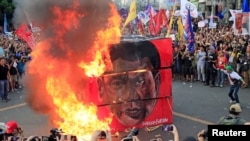Philippine President Rodrigo Duterte is facing his biggest ever wave of public protests, driven by fears of martial law and outrage over reports that police killed teenagers in an anti-drug campaign. But analysts expect his popularity to hold strong.
They say the tough-talking 72-year-old Duterte will retain his high popularity because a quiet majority of Filipinos feel safer now than before he took office 15 months ago.
“There is distrust over this increase in the cases that the police target practically anyone, but to a large extent the public actually agrees with the way the drug war is being conducted,” said Herman Kraft, a political scientist at University of the Philippines Diliman.
Surge in protests
On Thursday, thousands of people, including university students and opposition party members, demonstrated in Manila against what they see as extra heavy-handed policing in the campaign against illegal drugs.
Hundreds of police officers tracked the demonstration, which was timed for the anniversary of ex-president Ferdinand Marcos’s declaration of martial law in 1972. Smaller demonstrations erupted in Manila earlier in the month.
Some protesters compare Duterte to Marcos, who declared martial law and curbed people’s freedoms.
They believe Duterte has condoned extrajudicial killings by police officers as part of a campaign launched last year to eradicate the drug trade within six months. New York-based advocacy group Human Rights Watch estimates 7,000 extrajudicial killings under Duterte.
"On the killings, if the government is serious about solving them, it should allow an independent, impartial body...to conduct the investigation of these killings so as to be more credible to the public," the opposition Liberal Party said on its website.
The president has also declared martial law on the southern island Mindanao through the end of the year to help troops fight an armed Muslim rebel group in Marawi City. Curfews and road checkpoints on Mindanao raised fears Duterte would extend martial law to other parts of the 7,100-island archipelago.
People began to protest after mid-August, when 17-year-old high school student Kian Loyd Delos Santos of Caloocan City was shot to death north of the capital Manila, possibly by police. In separate police-linked incidents, a 19-year-old man was found shot to death and the body of a 14-year-old boy turned up full of stab wounds.
Calls for more due process
The government should “rethink its approach in its anti-drug campaign,” Vice President Leni Robredo said in a statement this month. Robredo, who is separately elected and close to opposition political groups, called for more “due process” and rehabilitation of drug users.
In February Duterte temporarily reined in violence in the anti-drug campaign to zoom in on stopping excesses among the Philippine National Police. His head of drug enforcement has also suggested more rehabilitation for drug abusers.
Duterte’s spokesman Ernesto Abella said Sunday the president is open to dissent. “We have always kept the doors open for constructive dialogue with the strategic sectors of society, including those who do not share the stance of the Administration on certain issues,” Abella said on the presidential office website.
Signs of continued support for Duterte
A Global Attitudes Survey poll taken in the first half of 2017 found that 86 percent of Filipinos approve of their president and 78 percent back his handling of illegal drugs. Metro Manila-based research institution Social Weather Stations said last week 80 percent of Filipinos were “satisfied with the way democracy works in the country.”
Fifty-seven percent say they are satisfied with “the way things are going in their country,” up from 36 percent three years ago, the Pew Research Center said in a report released Thursday. Analysts say this level support is unlikely to waver.
Protests against Duterte have failed the scale or length of time it took to challenge leaders in other countries. In Taiwan, tens of thousands gathered for 24 days in 2014 to spark a movement that eventually hurt the ruling party in elections. Last year hundreds of thousands demonstrated in South Korea to press then-president Park Geun-hye toward her resignation.
The Philippine economy also has expanded more than 6 percent over the past nine quarters, said Jonathan Ravelas, chief market strategist with Banco de Oro UniBank in Metro Manila. Investors like that, he said.
“Look at the forest not the trees,” Ravelas said. “I know that there are a lot of issues that we can talk about. However if you look at the general direction of the economy, it seems to be moving forward.”
Failure to act against rising prices, unemployment and graft could affect Duterte’s ratings longer term, said Maria Ela Atienza, a political science professor in Metro Manila. “When people are asked about their priorities, it’s still getting a job, addressing poverty and graft and corruption,” she said.
But a lot of Filipinos say their neighborhoods feel safer from all manner of crime under Duterte than before. The methamphetamine strain “shabu” underpins much of the country's street crime.
The government’s proposed allocation of just 1,000 pesos ($19.50) next year to a police watchdog agency also points to confidence in public opinion, said Carl Baker, director of programs with the think tank Pacific Forum CSIS in Honolulu.
“This development suggests to me that there is still a large number of people who continue to support Duterte's aggressive approach to the drug problem and are willing to look the other way in the face of extrajudicial killings,” he said.







